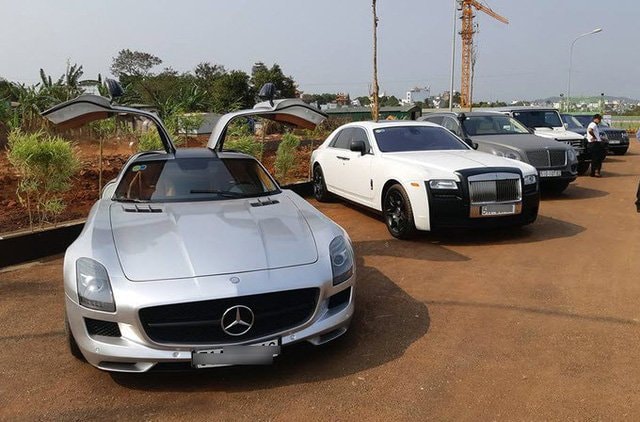List of cars that may be subject to property tax in Vietnam
The Ministry of Finance has just proposed a property tax on cars worth from 1.5 billion VND. How does this issue actually affect the car market? Which cars are affected?
Aiming at luxury cars and imported cars
In fact, the market currently has many types of cars in the segment under 1.5 billion VND that are having very good sales. At the price of 1.5 billion VND, most of them are luxury cars, imported cars. Of Honda's imported cars, only the Odyssey minivan has a price of 1.9 billion VND, the rest of the car lines such as City, Civic, CRV, Accord all have selling prices, rolling prices below the level of having to pay property tax.
|
| Vehicles taxed 1.5 billion VND are mainly imported vehicles, risk of non-tariff barriers to protect domestic vehicles. |
For Toyota models, the Vios, Altis, Innova, even the most expensive Camry and Fortuner are not subject to property tax when the price is just under 1.5 billion VND. Meanwhile, the Land Cruiser VX and Land Cruiser Prado are subject to property tax, when the price of these models ranges from 2.2 to nearly 4 billion VND.
For Ford, two car models in the sights of property tax are Ford Everest Titanium 3.2AT 4WD with a selling price of 1.9 billion VND and 2.2 billion VND (on-road price); another car model, Explorer, is also in the sights with a selling price of about 2.1 billion VND, on-road price of about 2.5 billion VND.
Meanwhile, small Ford cars such as Focus, Eco Sport or Ford Ranger pickup trucks are not subject to property tax as the price and on-road price of these cars are all under 1 billion VND.
In addition to joint ventures, the car market currently has many large domestic private companies participating in large-scale production and assembly such as Mazda and Kia assembled cars of Truong Hai - Thaco; imported cars of BMW, Peugeot or Mini Cooper...
Most of Mazda's car models are priced under 1.5 billion VND, the two most premium versions of Mazda, CX5 and Mazda 6, are also only priced around 1 billion VND/car. Car models such as Mazda 2, 3, BT50 are all priced below the tax rate.
Meanwhile, Kia similarly has no cars that are subject to property tax. The most expensive models such as Optima and Sedona are only priced from 1 billion to nearly 1.3 billion VND/car; other models are all priced lower.
Meanwhile, BMW, Mercedes, Lexus, Land Rover, Audi, Volkswagen, Volvo... are all in the group of cars subject to property tax. These are luxury cars, with high value but are loved and used by many people.
For example, the Lexus brand, this entire line of high-end cars would be "involved" in property tax if applied because all of these imported cars in Vietnam have the lowest price of 2.3 billion VND, the highest price is Lexus LX570 with a selling price of nearly 8 billion VND, the rolling price is nearly 8.6 billion VND.
Imported luxury cars are "difficult", but domestic cars are protected?
In fact, it is not necessary to wait until Decree 116 on conditions for the production, trading and import of automobiles, luxury cars and imported cars to enter Vietnam, but right from the time the amended Law on Special Consumption Tax (Law 106) took effect in July 2016, luxury cars have had difficulty entering Vietnam due to the high special consumption tax of 60% to 150%, an increase of 30% to 90% compared to before.
By 2017, when Circular 20 on conditions for trading in imported cars expired, Draft Decree 116 was issued, which set out many strict conditions and by the time it took effect (October 17, 2017), imported luxury cars seemed to have "disappeared" in Vietnam.
If the property tax is approved, luxury car users, in addition to paying a high special consumption tax, will have to shoulder an additional amount of 4.5 million to nearly 15 million VND/year (depending on the price, from 1.5 billion VND to about 5 - 6 billion VND/car). For this reason, it is possible that imported luxury cars will become increasingly "difficult" in Vietnam.
Meanwhile, the domestic market share belongs to the mid-range car segment with prices ranging from 500 to 1.3 billion VND. With the number of imported cars decreasing sharply, the domestic market is mainly assembled cars owned by joint ventures and private individuals, which poses a high risk of car prices being difficult to reduce, with companies colluding to keep prices down.
Currently, the Ministry of Finance has not provided any basis to justify the imposition of property tax on cars worth 1.5 billion VND. If the goal is to compensate for budget revenue or to collect budget revenue, then taxing cars worth 1.5 billion VND will hardly collect the "satisfactory" budget amount because the number of cars consumed for this type of car is not much, while the majority of cars sold for less than 1.5 billion VND.
In the case of property tax on cars priced above 1 billion VND, in theory, the tax will collect more and it is easy to explain the purpose of "increasing budget revenue". However, if the property tax on cars above 1 billion VND is collected, the impact will be very large, there will be a strong reaction from consumers and domestic manufacturing and assembly enterprises.
If we impose property tax on the price of a 1.5 billion VND car, the first target is the rich and luxury spenders, the second is to tighten the control of imported cars and create "non-tariff" barriers to protect domestic production.


